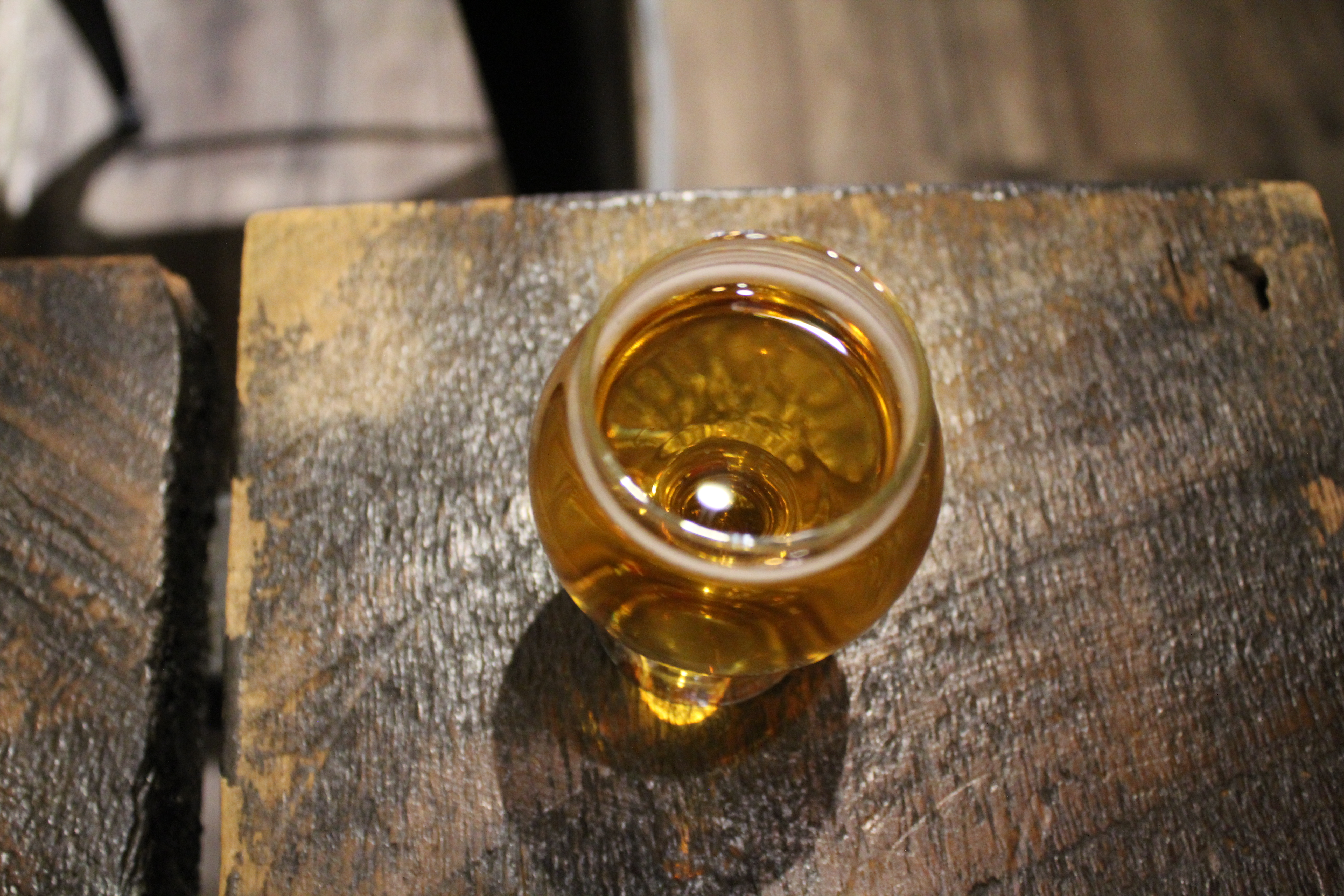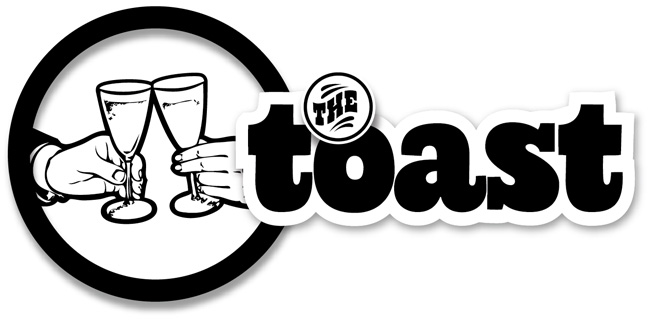 Today in the Toast: A taste of Duluth including the newly opened Hoops Brewing and Blacklist Artisan Ales, plus Fair State in Minneapolis.
Today in the Toast: A taste of Duluth including the newly opened Hoops Brewing and Blacklist Artisan Ales, plus Fair State in Minneapolis.
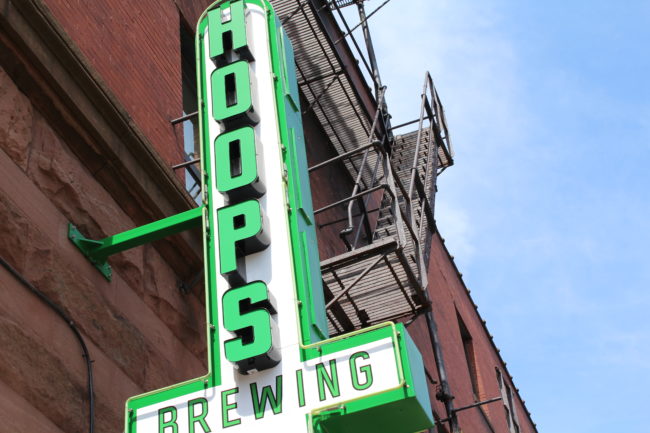
Hoops Brewing
When head brewer Dave Hoops (below) left Fitger’s Brewhouse in Duluth in the fall of 2015, his enormous fan base immediately asked what he would do next. As a major figure in the Minnesota beer scene — among the ranks of Summit Brewing’s Mark Stutrud, Schell’s Ted Marti, and Surly’s Omar Ansari — Hoops wasn’t likely to keep quiet for long. Indeed, his next project was soon announced, but drinkers had to wait until this summer to experience it.
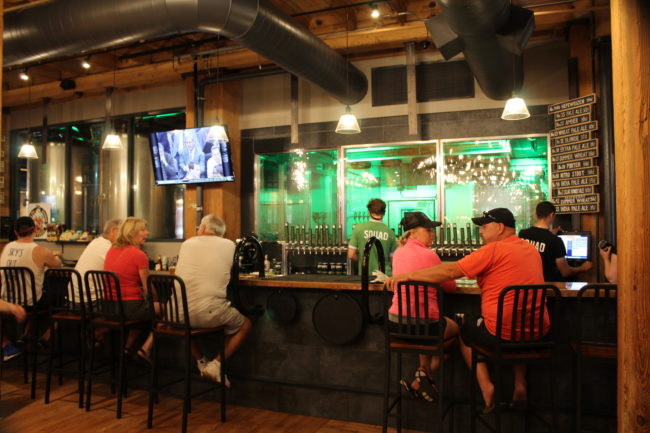
The brewery incorporates Hoops’ extensive brewing experience as well as his knowledge of the North Shore market. His head brewer, Melissa Rainville, also comes from Fitger’s, and the two operate a 15-barrel system. The large brewery occupies the former Timber Lodge Steakhouse space and showcases a shared bar that also acts as a low wall between the taproom and the full-service bar (a separate business called The Slip). This allows those enjoying liquor to join their beer-drinking comrades.

The space doesn’t scream North Woods, but there is a decidedly classic feel, with rich wood nearly everywhere. The brew house is illuminated by green lighting, as is the cooler behind the bar. The warm lights, along with the visible stainless steel, add a modern twist. Natural light permeates nicely.
The current beer offerings are classic, with a few multiples (three pale ales, for example). Nearly a dozen beers were available on tap, and a separate merchandise and to-go beer checkout echoes the model at Fitger’s. The taps are numbered with bold type reminiscent of that at The Freehouse in the North Loop. Table service was terribly rough during one visit but fair during another. We often found ourselves going to the bar for beer despite the full-service model.
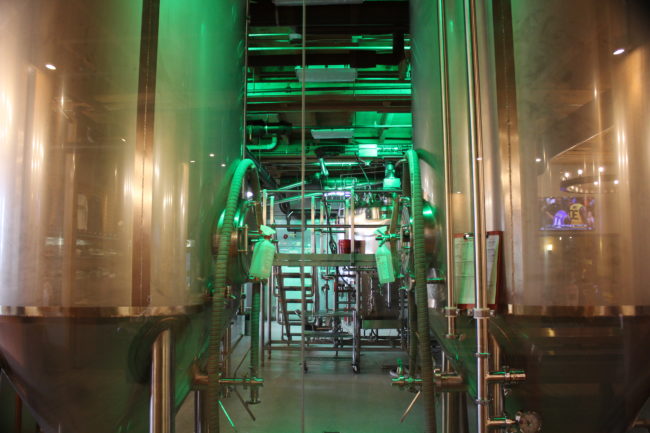
Of the two wheat beers, one was pleasant and universally appealing. The No. 17 Summer Wheat ($4.50 for 10 ounces) is moderate in alcohol at about 5.6 percent ABV. The aroma contains spicy phenols with a bright citrus presence. It’s full and soft at first sip, and stays very broad on the tongue. The finish is light, however, placing it in the easy drinking, crowd pleasing department.
The No. 5050 Hefeweizen (5.4 percent alcohol by volume, $4.50 for 10 ounces) is heavier overall, missing the mark for its style. The aroma has a strong canned-pear note and the flavor is phenolic, but not in a desirable way. It ventures into plasticlike territory. It is perfectly carbonated and lacks excessive residual sweetness, though. This was the least appealing beer of the otherwise successful offerings.
The No. 21 IPA was a beer that left us in complete awe. It is rare that an unassuming IPA with no specialty ingredients, creative brewing technique, or even a name can stand out in a market saturated with hoppy beer. The strong aroma is resinlike and herbaceous, an indicator of the brewing prowess behind the recipe. At 7.5 percent ABV, the crisp Pilsnerlike malt remains present with a sustained moderate bitterness. As each taste finishes with tangerine and marmalade, the roundness of flavor and texture fulfills its design ($4.50 for 10 ounces).
Hoops Brewing, 325 S Lake Ave, Duluth, MN 55802; 218.606.1666
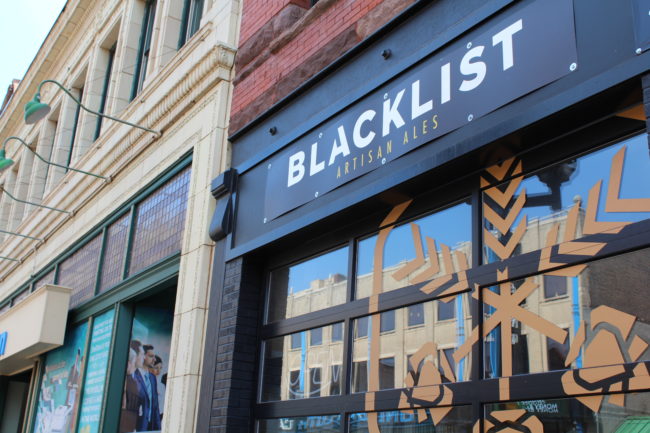
Blacklist Artisan Ales Taproom
Once a producer of bombers only, Blacklist Artisan Ales now boasts some serious new digs in downtown Duluth. The location — in the former (and infamous) Last Place on Earth storefront on Superior Street — will draw visitors and natives alike to an area that is slowly being revitalized.
Blacklist beers have been available in the Twin Cities for a few years, and brewer Brian Schanzenbach has been using a warehouse as a production-only space since debuting in 2012. The model has entirely changed, though, as the new facility has allowed for an immense increase in production and distribution. Blacklist signed a distribution agreement with Clear River Beverage Company and also started canning as a result of the move.
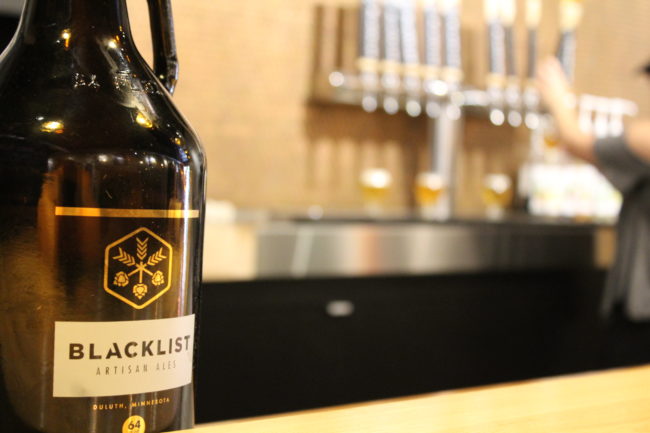
Visitors to the taproom can expect good service in an inviting environment. The narrow but long space was stripped down to the bricks, which remain exposed in many areas. Natural-wood benches line the walls, and pennies are used as tiles behind the bar. The stage at the front of the taproom creates a good balance between music venue and brewery so that neither feels like an afterthought.
Despite this promising upgrade, the inconsistencies in the bottled beer have not been eliminated by the addition of the taproom. On the positive side, there is a wonderful variety of beers, most with a Belgian influence.
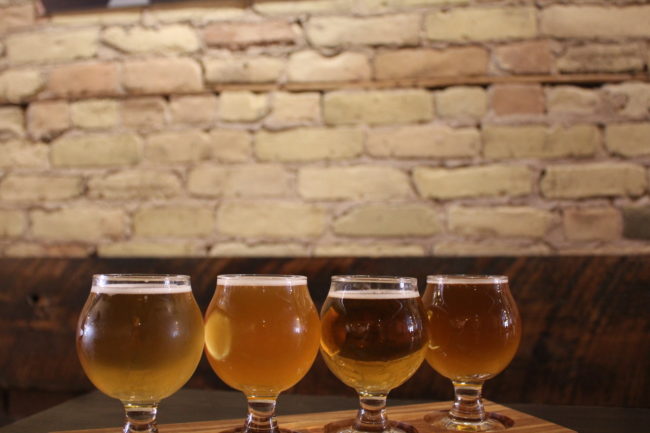
A flight of four small pours is $9, and we highly recommend going this route, as choosing a pint is quite a gamble. In the middle of the pack is the Hefe Royal, a German-style wheat with a classic clove and coriander nose. The taste is initially smooth and soft in the mouth, but it soon coats the tongue, preventing the typical crisp finish. The mild black pepper and warm spice notes pleasantly make up for the strange mouthfeel.
The major flop was the Belgian Single, a classic style similar to Belgian table beer, which is known for its mild flavor, low alcohol, and clean fermentation. This was highly problematic from start to finish, with an inappropriate ester aroma similar to the smell of a box of Runts candy. The finish is sweet and winelike, not unlike powdered Kool-Aid. The beer is also oddly undercarbonated, only adding to its heaviness.
Of the two specialty wit beers, the Makrut Wit With Poblano Peppers has a forgivable vegetal aroma, while the first sip is perfumelike due to the addition of makrut lime leaves (formerly known as kaffir). It’s not unpleasant given the added ingredients, though it becomes overpowering after a few ounces. The lime leaf builds quickly in waves of floral flavor. If the yeast were allowed to contribute more to the flavor, whether through the use of a different strain or through experimentation with fermentation temperature, the aromatics could be far more balanced.
The most successful of the flight was the Rhubarb Wit, which had far more Belgian wit character than the Makrut. It’s hazy with a barely-pink hue and a faint sour cherry aroma. The combination of flavors is similar to a rhubarb crisp, as the lightly toasted malt and fruit combine. The addition of the fruit creates an almost-tart harmony with the wheat as well as a lingering aftertaste.
Blacklist Artisan Ales Taproom, 120 E Superior St, Duluth, MN 55802; 218.606.1610
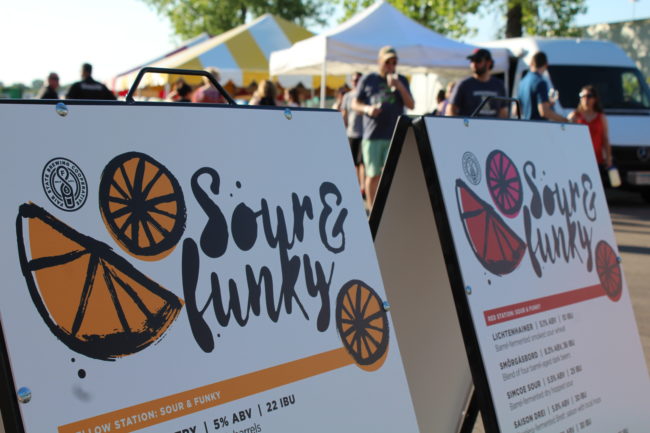
Fair State Brewing Cooperative
Minnesota’s first cooperative brewery has expanded into a second facility so much larger than the first that the new cooler is bigger than the original brewhouse. Fair State‘s new 30-barrel brewhouse, located in the Midway area of St. Paul, will enable the brewery to keep up with a significant demand for off-sale distribution and will allow for canning.
Four 90-barrel fermenters nearly touch the ceiling and four horizontal lagering tanks look slightly unusual in the modern setting. The horizontal tanks, which look like dairy tanks, will allow for better aging of lagers, which take longer to ferment and require lower temperatures to do so.
Adding to the excitement is the increased capacity for barrel-aging and mixed-culture fermentation — beers that rely on other organisms beyond traditional brewer’s yeast.
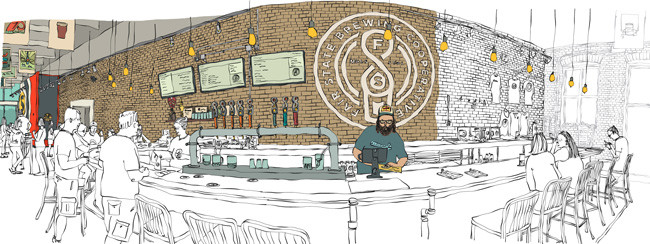
Pairing that with the immense amount of space surrounding the new building led to an expanded version of this year’s Mixed Culture, an event celebrating sour and wild beers. Favorites at this year’s festival included Fair State’s passion fruit Du Pounde, a variation on their dry saison with passion fruit added. The aroma is potent apricot nectar and lemon zest, while intense fruit flavor resolves in a crisp Meyer lemon finish. It’s moderately sour, making it a good entry-level sour, while the dryness sways it away from candylike flavor.
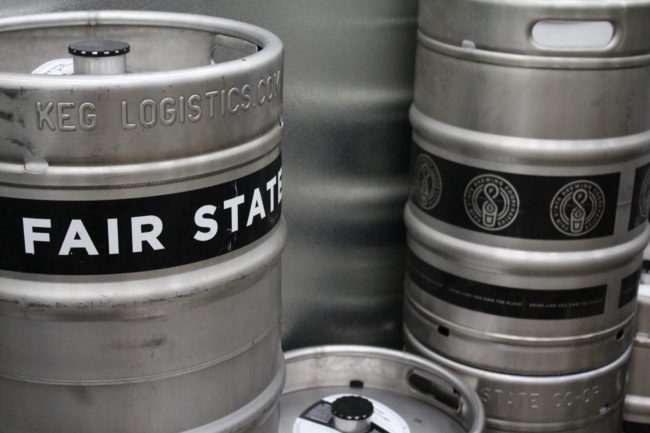
The fruit in Curation, a barrel-fermented sour ale re-fermented on plums, is more subtle. With an aroma of underripe stone fruit and a cooked plum taste, it comes across like the plum variety of those little plastic sticks of honey found at orchards and markets, but with a tart aftertaste. Cereal-like grain notes balance the acidity appropriately. Curation was the winning beer by popular vote at last weekend’s All Pints North beer festival in Duluth, and Fair State also won best brewery.
Finally, for something completely different, try the Time Debt, a dark sour fermented in bourbon- and rye-whiskey barrels. Strong whiskey aroma hits the nose immediately but is more restrained in the taste. Bitter cocoa plus smoke compete with the liquor background, while each sip has a sustained charred-wood presence. The combination of dark, sour, and boozy is not common, but this beer proves that it can work, playing off elements of Belgian Oud Bruin beers as well as the classic Whiskey Sour.
Fair State Brewing Cooperative, 2506A Central Ave NE, Minneapolis, MN 55418; 612.444.3209

